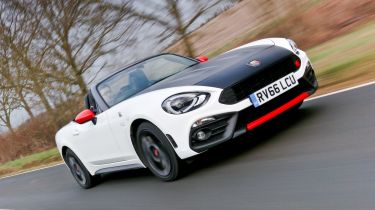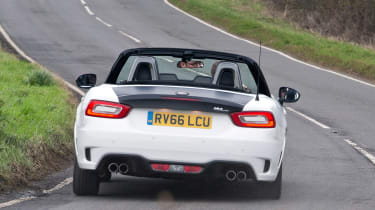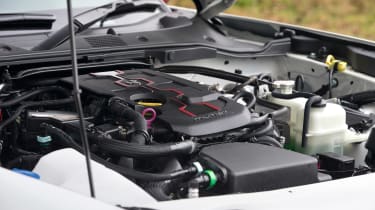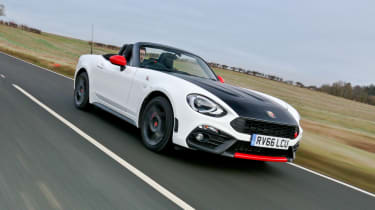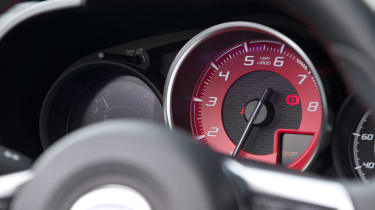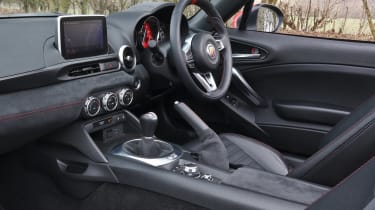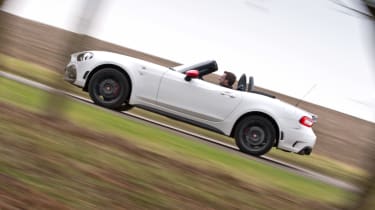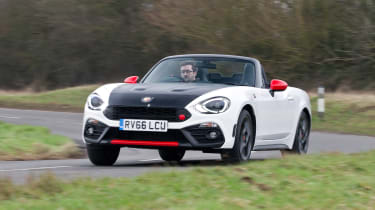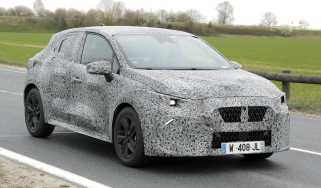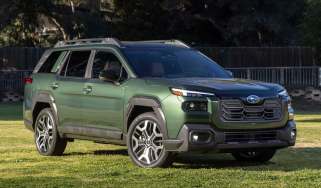Abarth 124 Spider (2016-2019) review
The Abarth 124 Spider is the best ‘MX-5’ you can buy, but it comes at a price

There aren't many two-seat roadsters for sale these days, but we think the Abarth 124 Spider is one of the best. In fact, the Abarth is one of a trio of models that share more than just a two-seat, rear-wheel drive, soft-top layout. That's because the Abarth and the Fiat 124 Spider on which it's based share a lot of their running gear with the Mazda MX-5.
Where the Abarth and Fiat models differ is with a more angular look, while Fiat uses its own engine under the bonnet, namely its 1.4 MultiAir turbo petrol. In the Abarth, the motor has been given a power boost, so it makes 168bhp, and it confirms what many driving enthusiasts believed - that the MX-5's chassis could easily cope with some extra power.
The differences between the Abarth and Fiat 124 Spiders are obvious by looking at them. The Abarth model adds some racy touches, including the famous Abarth scorpion badges, black wheels and red detailing (grey on blue cars), while inside there's alcantara trim, Abarth sports seats and red stitching.
Under the skin, the Abarth not only gets a power boost, it also adds a sports exhaust that gives it a great sound, plus there's Brembo brakes, Bilstein dampers and a limited-slip differential to help get the power to the road smoothly. These additions bump up the price of the Abarth 124 Spider, but they also help to give the car an edge over the rest of the Spider/MX-5 ranges.
Used - available now

2022 Peugeot
5008
45,452 milesManualDiesel1.5L
Cash £18,797
2025 Audi
A1 Sportback
37,015 milesManualPetrol1.0L
Cash £14,697
2021 SEAT
Ibiza
42,464 milesManualPetrol1.0L
Cash £11,397
2023 Peugeot
3008
15,646 milesAutomaticDiesel1.5L
Cash £20,097Prices for the Abarth 124 Spider start from £29,750, which is around £3,000 more than the Fiat 124 Spider. That's for the standard Abarth, while the Heritage Look model has subtle styling differences, but is the same price. At the top of the range the Abarth 124 GT costs around £4,000 more and gets a carbon fibre hard top bolted into place. This really defeats the object of the 124 Spider, as it makes open-top motoring harder to access, and prevents you from hearing that great exhaust note in full. All cars are available with a six-speed auto to replace the standard six-speed manual, although this does take away from the driving fun.
The MX-5 is the only direct rival to the Abarth 124 Spider, but if you're looking for a car with fun handling at a reasonable price, then you could also consider the Toyota GT86 and Subaru BRZ twins. They're not convertibles, but they do offer a fantastic driving experience.
If rear-wheel drive is what you're after, then the only other options at this price level are the ageing Nissan 370Z or maybe a BMW 2-Series (the former is coupe-only, the latter has coupe and open-top options). Alternatively, if you're after an open-top car, then the MINI Convertible offers fun front-wheel-drive handling for less money, and the entry-level Audi TT Roadster could be worth investigating.
With prices starting north of £29,000, the Abarth 124 Spider is far from cheap, but it’s a relatively small extra to pay to get behind the wheel of what is the best ‘MX-5’ you can buy. The beefed-up looks and extra power play a part in this verdict, but the Abarth’s party trick is the Record Monza exhaust system, which creates a symphony of noise.
Like the MX-5 you'll have to travel light as it's not the most practical car on sale, and we're not sure the fixed-roof GT is really necessary, but the 1.4-litre MultiAir engine delivers surprisingly good fuel economy for a two-seater sports car.
Engines, performance and drive
It’s almost impossible not to draw comparisons with the Mazda MX-5 when driving the Abarth, but it’s significant that the differences are noticeable. And this should be applauded; there’s no BRZ/GT86 identikit show here.
Press the starter button and the engine roars into life, with the Record Monza exhaust acting like a highly-tuned musical instrument. You’ll never tire of the exhaust note and blipping the throttle becomes highly addictive, especially on downshifts.
The Abarth immediately feels more rigid and beefier than the MX-5, helped by Bilstein dampers and stiffer springs and anti-roll bars. It’s also blessed with Brembo brakes and a mechanical limited-slip differential. Quite a package, then.
It shows. Once on the move, the exhaust note threatens to steal the show, but you’ll soon discover that the Abarth is about more than just a symphony. It corners with a near absence of body roll, with the turbocharger on hand to catapult you out of the bends.
The shortage of outright feel is a problem, but the steering is heavier than in the MX-5, albeit slightly less direct. But it doesn’t matter, because the Abarth has a playful side, with oversteer available should you want it, with the quick steering and limited-slip diff keeping you out of trouble.
It’s tempting to keep it in Sport mode for maximum attack, but on the occasions when playing isn’t possible or appropriate, the Abarth switches into a more relaxed and comfortable roadster. The 250Nm of torque means you’re not forever changing gear, making cruising and overtaking a doddle.
Engines
The 1.4-litre MultiAir is borrowed from the Abarth 500 and is the same unit found in the Fiat version. But while the Fiat has to make do with 138bhp, the Abarth benefits from 168bhp, making it 10bhp more powerful than the most powerful 2.0-litre version of the Mazda MX-5. It’ll manage 0-62mph in just 6.8 seconds, before reaching a top speed of 144mph.
Fire it up and your senses are stirred by the terrific soundtrack of the Record Monza exhaust system. Already the Abarth has the edge over the less well-endowed Fiat versions.
Initially, the engine feels a tad disappointing – you can blame the old-school turbo lag for that – but the magic starts once you hit 2,000rpm. This isn’t a car to take by the scruff of the neck to explore the redline. Peak torque comes in at 2,500rpm, making the performance remarkably accessible.
While some will prefer the naturally aspirated MX-5 engines, the turbocharged MultiAir engine delivers some much needed theatre to the 124 Spider, especially in the Abarth, when it’s accompanied by that operatic exhaust note.
A quick word about the optional six-speed automatic transmission. At £2,000, not only is it an expensive option, but it’s completely out of character with the roadster, with delayed shifts creating an infuriating driving experience. Avoid.
Something else that's tricky to recommend is the Abarth 124 GT. While the addition of a hard top adds structural rigidity (and its 16kg weight is offset by lighter wheels), removing the ability to quickly drop or raise the fabric roof arguably cuts into much of the standard 124's appeal.
MPG, CO2 and Running Costs
Fuel economy and CO2 emissions are rarely a key consideration when buying a sports car, but the 1.4-litre MultiAir engine delivers some reassuringly strong figures. A manual version could deliver as much as 44.1mpg on a combined cycle, with the automatic returning 42.8mpg.
In both cases that’s more than the 40.9mpg offered by the 2.0-litre version of the Mazda MX-5, but not as much as the 47.1mpg possible in the 1.5-litre version. In all cases, you’ll need to show some restraint to achieve the figures, although steering clear of B-roads won’t be easy.
If you’re still struggling to choose between the manual and automatic versions, the first-year tax rate might sway your decision. With CO2 emissions of 148g/km, an Abarth with a manual gearbox will cost £200 to tax, while the 153g/km of the automatic equates to a first-year rate of £500.
Insurance groups
All models fall into fall into the Group 29 insurance bracket, three higher than the Fiat 124 Spider. It’s the same as the 2.0-litre versions of the Mazda MX-5 which, given the potency of the Abarth, is a good result for the Italian.
Depreciation
Thanks to its limited production numbers, the Abarth 124 Spider has the strongest residual values of any car in the Fiat/Abarth Spider line-up. Buyers can expect to get half of their money back after three years/36,000 miles (at 50.9 per cent), compared to 44-47 per cent for the standard car. As you would expect, the less appealing automatic has a slightly poorer resale value.
Interior, design and technology
Fiat and Mazda should be applauded for managing to disguise the platform-sharing roots of their respective sports cars. To our eyes at least, the Abarth version is the best of the lot, oozing road presence and tipping the hat to its heritage without being overtly retro.
The exterior panels are completely bespoke, while the Spider is 139mm longer and 10mm wider than the MX-5. It could be argued that the Fiat is less elegant than the Mazda, but the Abarth has no such issues.
It helps that the 17-inch alloy wheels fill the arches, while the enlarged air intake, rear diffuser, bonnet bulge and side skirts complete the racing effect. Tick the box marked ‘Heritage Look’ for a matt-black bonnet and bootlid.
There are five colours to choose from, with San Marino 1972 black the only no-cost hue. Costa Brava 1972 red and Turini 1975 white will set you back about £400, while Isola d’Elba 1974 blue and Portogallo 1974 grey each cost around £600.
Inside, the Abarth is surprisingly gloomy, but the cabin can be lifted by the no-cost option of black and red leather seats. Further details to set the Abarth apart from the Fiat include a chunkier steering wheel and stubby gearlever, along with an Alcantara-trimmed dashboard and centre console inserts.
Standard equipment is generous, with heated seats, keyless start, automatic air conditioning, cruise control, DAB digital radio, 7-inch touchscreen and Bluetooth fitted as standard. Options include sat-nav, a Bose sound system and a Visibility Pack comprising full LED headlights, automatic lights and wipers, plus rear parking sensors.
All models get an Abarth numbered plaque, screwed on the bulkhead between the two seats. It’s a nice touch, which reminds you that you splashed the cash on the flagship 124.
Sat-nav, stereo and infotainment
As the flagship of the 124 Spider range, the Abarth comes pre-loaded with a full suite of audio/visual options, but you’ll pay extra for sat-nav. Four speakers are fitted as standard, with media controlled via a seven-inch touchscreen.
There are two USB ports and one AUX port, with smartphone connectivity via Bluetooth or the Aha or Stitcher apps. You can spend around £800 on a premium Bose audio system, complete with nine speakers and a subwoofer, but you’ll be hard pressed to top the evocative exhaust note.
As yet, Apple CarPlay and Android Auto are not available.
Practicality, comfort and boot space
You have to make one or two sacrifices when buying a two-seater sports car, but the Abarth 124 Spider is surprisingly practical.
The manually folding fabric roof disappears quickly and easily in a few seconds, providing welcome relief for 6ft-plus drivers and passengers who might find the cabin to be a little too cosy. It’s far from cramped, and instead evokes memories of classic roadsters of the past, albeit with a few more creature comforts and, we suspect, fewer leaks.
The driving position is low slung and easily the best of the MX-5/124 range, giving you a tremendous view down the long bonnet (bulge included).
A decent sized lockable glovebox is situated between the two seats, along with small door pockets and a space for your smartphone to the front of the gearlever. This is where you’ll also find the two USB ports.
A pair of removable cupholders are located between the seats, one of which can be relocated to a slot to right of the passenger side footwell. Wherever you put them, they’ll get in the way of either your elbow or your passenger’s knee.
Size
At 4,045mm in length and 1,740mm wide, the Abarth 124 Spider is 130mm longer and 5mm wider than the Mazda MX-5. At 1,233mm, it’s also fractionally taller than an MX-5 riding on 17-inch wheels.
It means that the 124 Spider loses some of the compactness and perfect proportions of the MX-5, but the effect is less obvious on the Abarth version.
For those tempted by the Abarth 124 GT, note that removing the hard-top roof is not the matter of an instant: there are five screws to undo, plus you'll need a friend to help you lift it, as well as somewhere to store it when it's off.
Leg room, head room & passenger space
The additional length and width doesn’t equate to additional space in the cabin, which is lifted straight from the Mazda MX-5 and treated to a series of Abarth upgrades.
Legroom is perfectly adequate, even for the tallest drivers and passengers, although anyone over six feet tall might find the headroom a tad restrictive with the roof up.
Boot
With 140 litres of boot space, the Abarth offers 10 litres more than the MX-5, and the boot is shaped to allow the carrying of two cases. The fabric roof folds into the slot behind the seats, with no impact on the luggage capacity.
Reliability and Safety
The Abarth 124 Spider is built alongside the regular 124 Spider adn MX-5 at Mazda’s factory in Japan, so the build quality is better than you’d expect on other Italian cars. We’d also expect the Abarth to be dependable in the long term.
Fiat’s 1.4-litre MultiAir engine is tried and tested in a number of Fiat and Alfa Romeo products, so we don’t expect it to provide too many problems. If something does go wrong, servicing and parts won’t be an issue.
Standard safety equipment includes electronic brake force distribution (EBD), electric stability control (ESC), four airbags, tyre pressure monitoring and headlight levelling system.
A Euro NCAP safety rating is unlikely, but the Mazda MX-5 was awarded a four-star rating, scoring 84 percent for adult occupants, 80 percent for child occupants and 93 percent for pedestrian safety. It was let down by a lack of cutting-edge technology, which is to be expected on an affordable roadster such as this.
Warranty
Like the standard Fiat 124 Spider, the Abarth benefits from a three-year unlimited mileage warranty, giving it an edge over the MX-5’s 60,000-mile cover. The Abarth also comes with a three-year roadside assistance package and three-year paintwork warranty.
Servicing
An Abarth 124 Spider will require a service every 12 months or 9,000 miles, whichever comes soonest, which is shorter than the MX-5’s 12,000-mile intervals. But given the fact that these cars aren’t likely to rack up huge miles, this shouldn’t be an issue.
Abarth offers so-called Easy Car servicing plans, available from one to five years and a maximum of 45,000 miles. The chosen plan can be included in a monthly contract hire plan.
